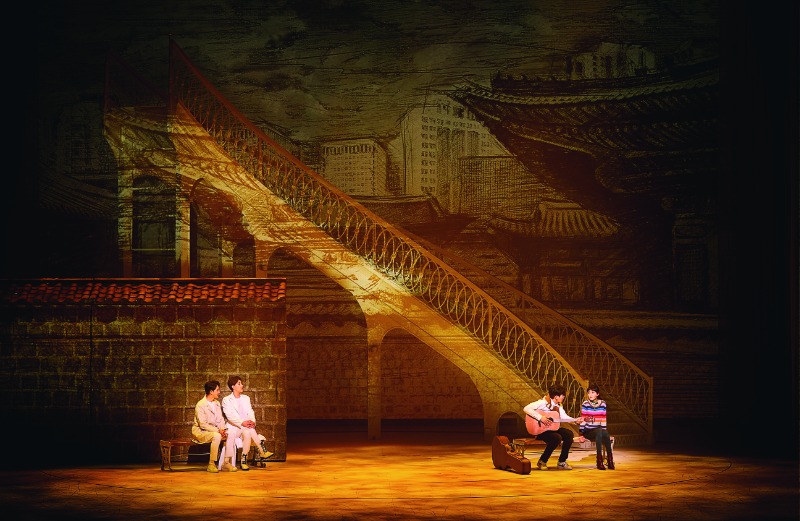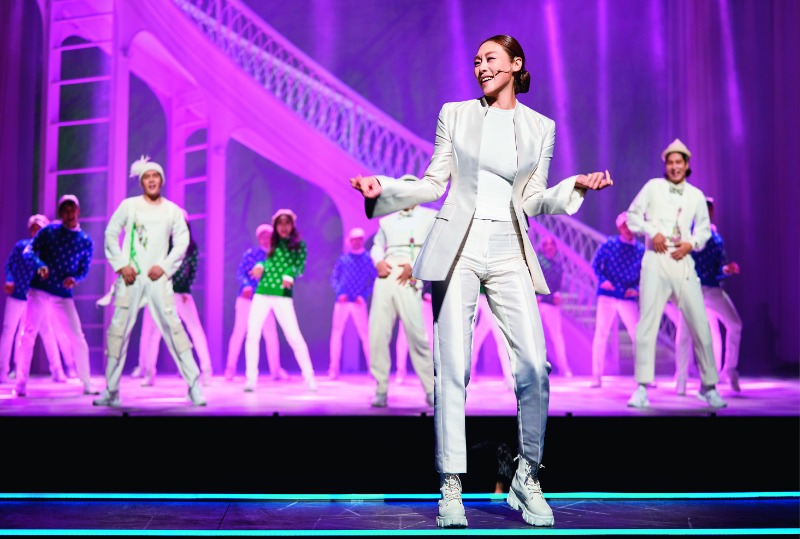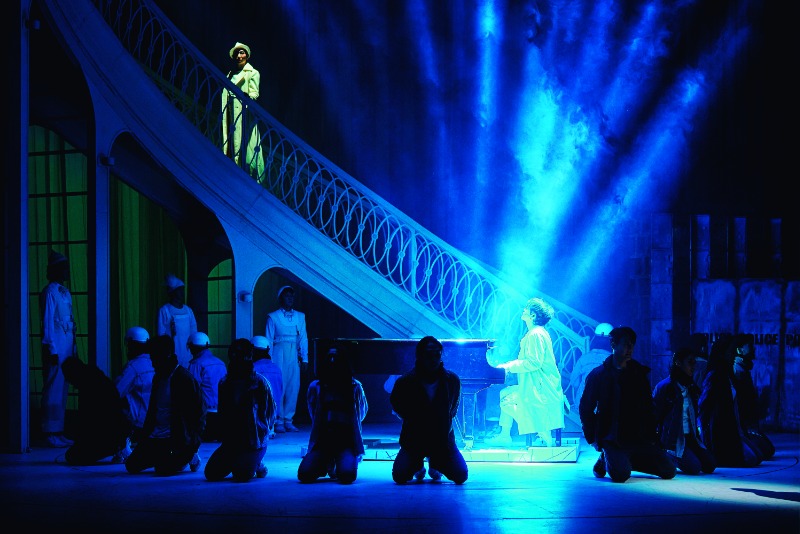Pop ballads by the late composer Lee Young-hoon (1960-2008), which stirred up the emotions of youths in the 1980s and 1990s, remain ever popular. The musical “Gwanghwamun Sonata,” a compilation of these old-time favorites, was successfully staged this fall for a third run, setting a new milestone in homegrown jukebox musicals.

“Gwanghwamun Sonata” is a jukebox musical based on hit ballads of Lee Young-hoon (1960-2008), a popular composer of the 1980s and 1990s. The stage design features Gwanghwamun, the main gate of Gyeongbok Palace, and the road along the wall of Deoksu Palace – the backdrop for Lee’s song lyrics that evoke nostalgia among those who loved his songs.
© CJ ENM
The most popular musicals these days are either “moviecals” based on well-known movies of the past, or jukebox musicals woven with old pop songs. “King Kong,” featuring a giant gorilla doll roaming the stage, or “Mary Poppins,” adapted from the movie of the same name directed by Robert Stevenson, are examples of the former genre. “Jersey Boys,” seasoned with popular tunes of American rock band The Four Seasons, and “Mamma Mia!” featuring the hits of the Swedish group ABBA are synonymous with the latter. Currently, numerous jukebox musicals, also known as pop musicals, are enjoying popularity on the global stage.
The rage for jukebox musicals has made its way into Korea as well. Deserving particular attention is “Gwanghwamun Sonata,” which was performed at the Seoul Arts Center from July to September and will be touring other cities around the country until year-end.
“Gwanghwamun Sonata” is a so-called tribute musical, with a story spun around songs composed by Lee Young-hoon and sung by Lee Moon-sae. It’s difficult to discuss Korean popular music of the 1980s and 1990s without mention of these two names. Lee Young-hoon in particular left behind numerous hits, as if he had Midas’ golden touch.
Audiences of the musical hum along to Lee’s hits, including the eponymous “Gwanghwamun Sonata” (1988), “When Love is Gone” (1987), “Under the Shadow of Street Trees” (1988) and “Old Love” (1991). Therefore, it can be said that, like most popular jukebox musicals, “Gwanghwamun Sonata” successfully plays on nostalgia, attracting not just dedicated musical fans but also those who loved the late composer’s songs. When “Sunset Glow” (1988), remade by the idol group Big Bang in 2008, plays during the curtain call, the audience finds it difficult to stay seated. This “sing-along curtain call,” which brings the audience to their feet to sing at the top of their voices, is an extraordinary experience.
Sing-Along Curtain Call
Uniquely, three different versions of “Gwanghwamun Sonata” have been staged. The first attempt to build a musical around Lee Young-hoon’s songs was made by Gina Lee, a popular musical director, and was staged in 2011 at the Sejong Center for the Performing Arts. Some say that the composer created the basic plot himself when he was in the terminal stage of his cancer. Depicting the intertwined love and lives of a young woman and two men, the show was a huge hit with middle-aged audiences, making it a rare box office success for a local creative musical premiered on a large stage. A follow-up run opened at the LG Art Center the following year.
“Gwanghwamun Sonata 2” by director Kim Gyu-jong, performed in 2013, was a spin-off of the previous work. As emphasis was placed on live performance, it was staged mainly in small theaters, with each musician positioned on a checkerboard-shaped set, adding to the appeal of its music elements. This concert-like version went on tour in several Chinese cities, such as Shanghai, Hangzhou, Nanchang and Fujian.

Musical actress Cha Ji-yeon, who leads the narrative in her role as a time travel guide, received rave reviews for her display of explosive energy. This latest version of the musical “Gwanghwamun Sonata” was written by playwright and director Ko Sun-woong, mixing memories, reality and fantasy, and directed by Gina Lee.
© CJ ENM
Three Versions
The third version of “Gwanghwamun Sonata,” re-written by famous playwright and director Ko Sun-woong and directed once again by Gina Lee, premiered in 2017 at the Grand Theater of the Sejong Center for the Performing Arts and had a second run in 2018. It had its third run this year. The story traverses memory, reality and fantasy as the dying protagonist revisits his past to find true love.
Living up to the name of its director, who is known for her stylish staging, this version earned acclaim for its dreamy yet poignant mood and effective presentation of Lee Young-hoon’s music, which remains as appealing as ever. The gender-bending casting, where actors were given roles regardless of their gender, was another attention-grabbing factor.
The success of this show can be attributed to the skillful production crew, the cast of well-known singers and actors, good chemistry between the director and music director, and the sophisticated stage design. The marketing strategy and perfect timing contributed as well.
Lee Young-hoon didn’t get his start in the popular music scene. He began his career composing background music for plays, broadcasts and dance performances, expanding to popular music in the 1980s when he was in his mid-20s. That’s when he met singer and TV host Lee Moon-sae, who, despite having debuted in 1978 and released his second album, was more famous as a radio DJ than a singer at the time.
However, when the two musicians collaborated to put out Lee Moon-sae’s third album in 1985, the title song, “I Don’t Know Yet,” was so popular that it stayed in the number one spot for five consecutive weeks on a TV music program. Many of the other songs on the album were also hits and Lee Young-hoon emerged as the top lyricist and composer in the Korean pop music world. Lee Moon-sae’s fourth album, “When Love is Gone,” released two years later, sold 2.8 million copies and is listed on Korea’s 100 best pop music albums.
A Legendary Duo
The duo worked together up until Lee Moon-sae’s 13th album, “Chapter 13,” released in 2001. When their collaboration became less frequent, Lee Young-hoon made music for TV dramas and movies. He also released an orchestral album featuring rearrangements of the songs he had written for Lee Moon-sae. Today, a monument erected in praise of Lee Young-hoon’s songs on the road along the wall of Deoksu Palace in Jeong-dong, near Gwanghwamun in central Seoul, continues to attract people who fondly remember those times.
In Korea, “Mamma Mia!” is considered the be-all and end-all of jukebox musicals, but there’s a lot more to talk about when the genre is segmented. Jukebox musicals can be divided into two types: compilation musicals like “Rock of Ages,” which introduces rock from the 1980s, weaving together various songs from unspecified musicians under a common theme; and tribute musicals like “Gwanghwamun Sonata,” which only use the musical assets of a specific artist. While the former has the advantage of freely mixing the music of various artists to suit the given theme, time or format, the latter holds appeal not only for musical fans but also the fans of the chosen artists or their music. If the musician in question is no longer active or has passed away, the interest is bound to double.

In a flashback to the 1980s, when young people took to the streets to protest military dictatorship, rock singersongwriter Yoon Do-hyun in the lead role plays the piano and sings Lee Young-hoon’s 1988 hit, “My Old Lover.”
© CJ ENM
It can be said that, like most popular jukebox musicals, “Gwanghwamun Sonata” successfully plays on nostalgia, attracting not just dedicated musical fans but also those who loved the late composer’s songs.
Familiarity
The reason for the popularity of moviecals and jukebox musicals is simple: the audience doesn’t have to deal with unfamiliar songs and stories at the same time. It isn’t always easy to sit through dozens of new songs performed on stage for a few hours straight. While it’s natural for any composer to attempt to present as many beautiful songs as possible, employing all their musical capacities, an audience may not be able to digest it all. Therefore, they might repeat variations of the main melody or create and distribute a concept album before the curtain goes up for the premiere of a musical.
In that sense, the jukebox musical format certainly has advantages. The songs performed on stage are already familiar to the audience and, as they are played live, the vibrancy and dynamism are incomparable to listening on the living room audio or through a small speaker on the desk. This is the reason jukebox musicals attract not only musical aficionados but also fans of the original songs or artists. Furthermore, as the audience already knows the content, the producer can be relieved of the burden and risks of promotion.